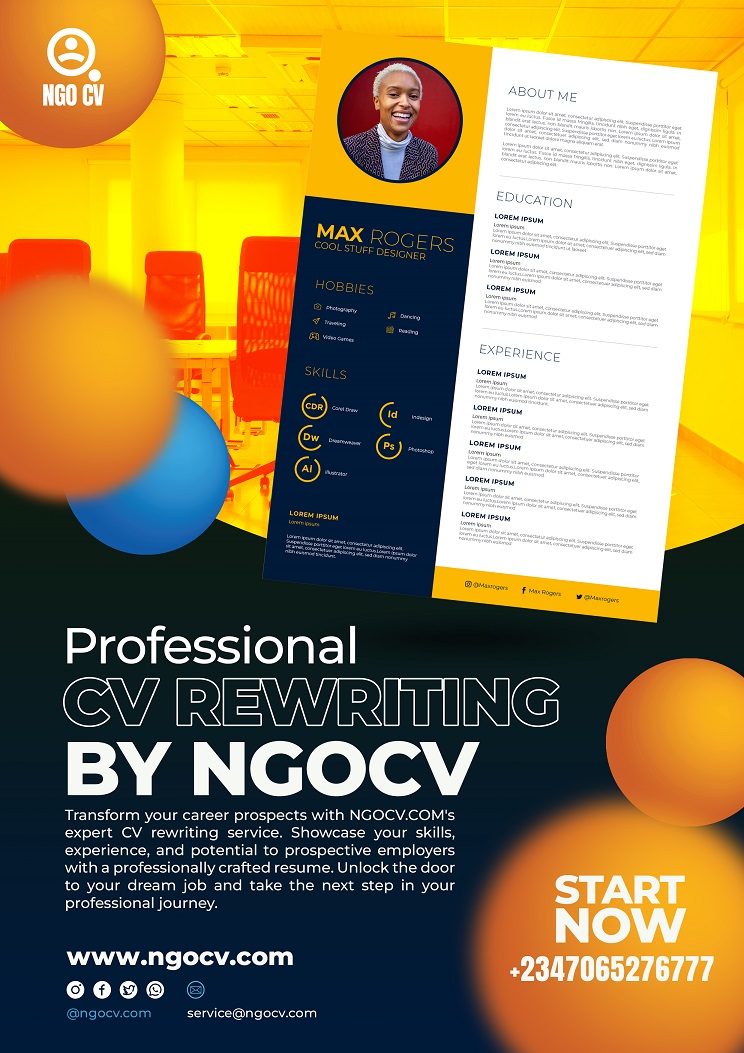
Search for Common Ground (Search) is seeking the services of individual Data enumerators living in or familiar with the North East region for a Conflict Sensitivity and Risk Assessment in Borno and Yobe states. Search is primarily interested in individuals with past field experiences in quantitative and qualitative data collection exercises especially in the target states. Interested individuals should include details of previous data collection experiences with a detailed description of specific tasks executed on their resume. Interested applicants should also include language skills and proficiency levels of Hausa and Kanuri in their resume.
About Search for Common Ground
Search for Common Ground (Search) is the world’s largest international non-governmental organization dedicated to conflict transformation and peacebuilding. Established in 1982, its mission is to transform the way the world deals with conflict – away from adversarial approaches and towards collaborative problem-solving. With headquarters in Washington D.C and Brussels, Search works in over 41 countries across Africa, the Middle East, Asia, Europe and North America. Search’s head office in Nigeria is located at Abuja with other field offices at Jos, Yola, Warri, and Maiduguri. With more than 600 staff worldwide and with close to 100 staff in Nigeria, mostly composed of local nationals working across all conflict parties, ranging from grassroots organizations to top-level leaders, we develop locally-adapted responses to a wide range of conflict issues, using a toolkit that includes capacity-building, mediation and alternative dispute resolution, community dialogue, arts-based approaches, and mass media to advance conflict prevention and resolution. Search has developed strong trust and relationships with communities, civil society, security forces, and local and state governments, using its deep knowledge of the context and a careful community entry strategy that engages all stakeholders particularly gatekeepers and marginalized groups such as women and youth. Across the target regions, our work is addressing some of the country’s most crisis-affected communities and security challenges including farmer-herder clashes, banditry, Boko Haram insurgency, and security and human rights abuse.
About the Project
Search for Common Ground is implementing a 4 months Conflict sensitivity and risk assessment in Borno and Yobe states in Northeast Nigeria, with funding from a donor. The assessment would examine how the donor’s interventions can meet humanitarian needs, while minimizing negative and unintended effects and contributing to social cohesion to promote long term sustainability. Search will deploy a combination of extensive desk review and exploratory research using quantitative and qualitative methodology. This approach will adopt a review of secondary data covering the context of Borno and Yobe states and primary data collection using a mixed methodology (quantitative and qualitative) through structured questionnaires and surveys.
Goal and Objectives Study
The proposed conflict sensitivity risk assessment to assess the donor’s sites of operation in Yobe and Borno States has the following objectives/ domains: Objective 1: The context of the conflict; the causes/drivers of the conflict; the actors involved and their relationships; the dynamics and possible future trends/scenarios. Objective 2: The risks that the donor might inadvertently have a negative impact on the context and end up creating or exacerbating divisions, tensions and violence – operations and programmatic risks;Objective 3: Possible mitigation measures and suggestions for programme adaption; Objective 4: The opportunities to contribute positively to the prospects for peace.
Search will also collect information on how donor could integrate a gender lens in its program design that lead to enhanced understating of the differentiated impacts of the conflict on women and men as well as support donor to gain a better knowledge of gender roles and/or social norms based on gender that contribute to create or perpetuate conflict dynamics.
Methodology
The study will adopt two approaches; the first will be a systematic extensive desk review analysis and secondly, a mixed-method (qualitative and quantitative) approach which will include in-depth interviews with Key Informants (KII), Focus Group Discussions (FGD), and a household survey. The KIIs and FGDs will be conducted using semi-structured questionnaires and guides to elicit responses for the qualitative study, while the household survey will be conducted using structured questionnaires to gather responses for the quantitative study. These methodologies are elaborated below: Mixed-Methodologies (Quantitative and Qualitative data collection processes)The study will adopt mixed methods to gather qualitative data from participants using Focus Group Discussions (FGDs) and key informants interviews (KIIs) approaches. The respondents will be selected from the community leaders, traditional leaders, religious actors, women groups, youth groups and children across the 6 LGAs in Borno and Yobe states. Search will also conduct key informant interviews with actors at the state and LGA levels. There will be a semi-structured questionnaire administered to households comprising men, women, youth and children in the communities to generate relevant quantitative data to measure the domains stated in the study matrix. This short survey will collect quantitative data on general issues around the context, triggers and actors of the conflict, the risk that the donor’s operation might lead to negative and unintended impacts, possible mitigation measures for program adaptation and opportunities to contribute positively to peace.
Geographic Locations
The intended locations for the primary data collection for the conflict sensitivity and risk assessment on the donor’s sites of operation will be conducted across 6 LGAs across Borno and Yobe states in the North East, Nigeria. The LGAs were selected by the donor, based on geographical and operational criteria, including among others scale up of the donor’s caseload in existing locations and new locations where the donor has started to provide assistance following a targeting exercise.
Below are the proposed LGAs for the study in Borno and Yobe States:Borno States: Monguno, Ngala and Bama LGAs.Yobe states: Damaturu, Bursari and Bade LGAs
Deliverables
Search expects the following deliverables from the selected individuals as they correspond to the timeline and budget:Resume describing experiences in qualitative and quantitative data collection exercises in the Northeast, especially Borno and Yobe states.Daily submission of quantitative data collectedNarrative report of all Key Informant interviews and Focus Group Discussions conductedSigning and submission of contracts
Logistical Support
Search will be responsible for organizing the logistics for data collection (vehicles and drivers), and at least one Search staff member may be available in each State to support data collection.
Ethical Considerations
To ensure that the study is ethical, participation will be voluntary for all respondents. Respondents will be informed of the purpose of the study and given the option to opt-in or out of the study. Only participants who freely give their consent to be part of the study will be interviewed. Also, data will only be collected from respondents 18 years and above.
Safeguarding and Child Protection Policy
Search for Common Ground (Search) considers all forms of abuse towards children, youth and vulnerable adults to be unacceptable. Our Safeguarding and Child Protection Policy set out the measures we will take to safeguard children, youth, and vulnerable adults. This includes proactive actions to prevent situations of abuse and harm occurring, and reactive actions to respond to situations where a child, youth or vulnerable adult is, or may be, suffering abuse.Who is a child? A child is any human under the age of 18 as stipulated by the UN Convention on the Rights of the Child, 1989.
Who is considered youth? Youth is the transitional period between adolescence and adulthood, for this policy we focus on the group of individuals ages 15 to 25 years old.
Who is a vulnerable adult? A person who by reason of disability, age, gender, social and economic status, illness, or the context they are in, may be unable to take care of or protect him or herself against abuse, harm or exploitation.
As part of our Safeguarding and Child Protection Policy, it is a requirement that all staff including but not limited to all permanent and temporary members of staff; Community based staff or incentive worker; Volunteers and interns; Consultants; Translators; Search’s Board of Directors; Invited visitors (including donors/ funders; media/ journalists); Partner organizations; Third-party contractors (i.e. supplies, builders, etc); Members of research bodies, academic institutions, associates, and all Search’s affiliates, agree to abide by the Safeguarding and Child Protection Policy and have signed it before commencing any work with the children. The umbrella term ‘Search affiliates’ will be used to refer to all people associated with Search.
It is a Mandatory requirement that any form of unacceptable behavior which breaches this safeguarding policy must be reported. In the case of situations which are not covered by the safeguarding policy, Search expects its representatives to apply common sense whilst focusing on the “child’s best interests”.
Data Quality Assurance and ManagementTraining of data collectors: Search Design, Monitoring and Evaluation (DMEL) team will facilitate a one day in person training (including both capacity building and piloting) for data collectors/research teams in each state in preparation for the field data collection. The training will be interactive and participatory. Enumerators will be presented with an overview of the research methodology and analytical framework, as well as in-depth instruction and practice on the use of the research tools. This comprehensive training is essential to ensure high quality, consistent and ethical research processes. Significant time will be dedicated to data recording and handling methods. The training will also explore the ethical considerations associated with this research and develop a plan of action to address or mitigate these concerns. At the end of the training, all participants will sign a contract of engagement with Search.After the training, all data enumerators will be involved in simulation exercises, and the research tools will be piloted in order to make any necessary adjustments before the field data collection. The pilots will be treated as ‘live’ exercises where the teams will also be required to complete the write-up and processing of the different tools. Although insights obtained through the piloting process will inform the study in general, data collected in the pilots will not constitute part of the final research sample and would create a more diverse approach to the COVID-19 context and dynamic as the target cuts across different groups.
Timeline
Location: Borno StateProposed Training Date – 18th to 20th November, 2021Proposed Data Collection Date – 21st to 30th November, 2021
Yobe StateProposed Training Date – 18th to 20th November, 2021Proposed Data Collection Date – 21st to 30th November, 2021
- Requirements of Enumerator and/or consulting Organization
- The following skills and experiences are expected from the Data enumerators to be engaged on this project:
- Previous data collection experience (worked with Search on any survey and assessment in the past is a strong advantage).
- Ability to Use Mobile Apps for data collection.
- A good understanding of the project LGAs in Borno and Yobe States and good knowledge of the local context.
- Good command of English and any relevant local languages (Hausa, Kanuri, Fulfulde) is required.
- The Applicant should be a graduate of any of the accredited high institutions within or outside Nigeria.
- Experience in conducting interviews, surveys or focus groups discussion is required.
- Familiarity and experience with contextual challenges in the geographic location(s) where the study will take place.
- In addition the selected individuals are required to respect the following Ethical Principles:
- Comprehensive and systematic inquiry: Enumerators should make the most of the existing information and full range of stakeholders available at the time of the study.
- Competence: Enumerators should possess the abilities and skills and experience appropriate to undertake the tasks proposed and should practice within the limits of his or her professional training and competence.
- Honesty and integrity: Enumerators should be transparent and observe all ethical considerations for data collection.
- Respect for people: Enumerators respect the security, dignity and self-worth of respondents, program participants. Enumerators have the responsibility to be sensitive to and respect differences amongst participants in culture, religion, gender, disability, age and ethnicity.
- To apply, interested candidates are requested to submit the following two documents:
- An application letter, clearly specifying location of interest with a copy of the individual’s resume work experiences in the target areas.
- Note: Only two mentioned documents can be submitted on Search’s recruitment portal.
Only applicants invited for an interview will be contacted. No phone calls please. Please see our website www.sfcg.org for full details of our work.
All Search Employees must adhere to the values: Collaboration- Audacity – Tenacity – Empathy – Results. In accordance with these values, Search enforces compliance with the Code of Conduct and related policies on Anti Workplace Harassment, Protection from Exploitation and Abuse, Child Safeguarding, Conflict of Interest and Anti-fraud. Search is committed to safeguarding the interests, rights, and well-being of children, youth and vulnerable adults with whom it is in contact and to conducting its programs and operations in a manner that is safe for children, youth, and vulnerable adults. Search for Common Ground does not and shall not discriminate on the basis of race, color, religion (creed), gender, gender expression, age, national origin (ancestry), disability, marital status, sexual orientation, or military status, in any of its activities or operations. View our code of conduct here and our privacy policy here.
As job descriptions cannot be exhaustive, the position holder may be required to undertake other duties that are broadly in line with the above key responsibilities.
Only applicants invited for an interview will be contacted. No phone calls please. Please see our website www.sfcg.org for full details of our work. All Search Employees must adhere to the values: Collaboration- Audacity – Tenacity – Empathy – Results. In accordance with these values, Search enforces compliance with the Code of Conduct and related policies on Anti Workplace Harassment, Protection from Exploitation and Abuse, Child Safeguarding, Conflict of Interest and Anti-fraud. Search is committed to safeguarding the interests, rights, and well-being of children, youth and vulnerable adults with whom it is in contact and to conducting its programs and operations in a manner that is safe for children, youth, and vulnerable adults. Search for Common Ground does not and shall not discriminate on the basis of race, color, religion (creed), gender, gender expression, age, national origin (ancestry), disability, marital status, sexual orientation, or military status, in any of its activities or operations.
View our code of conduct here and our privacy policy here.
https://jobs.lever.co/sfcg/ad83c8e3-83a1-4e86-96d7-41d5f6ad8b48/apply




